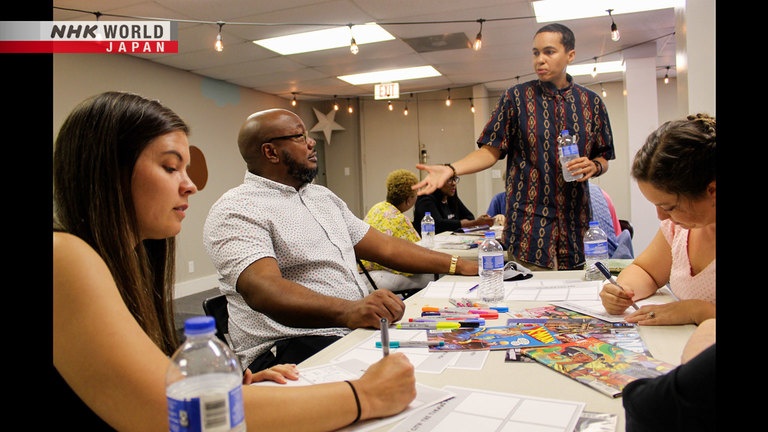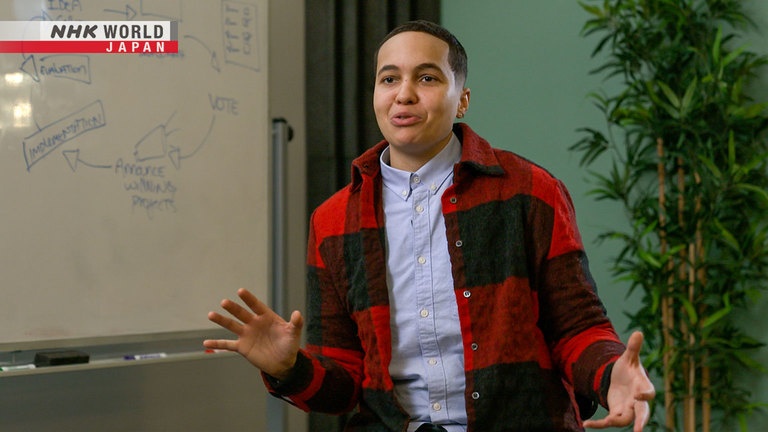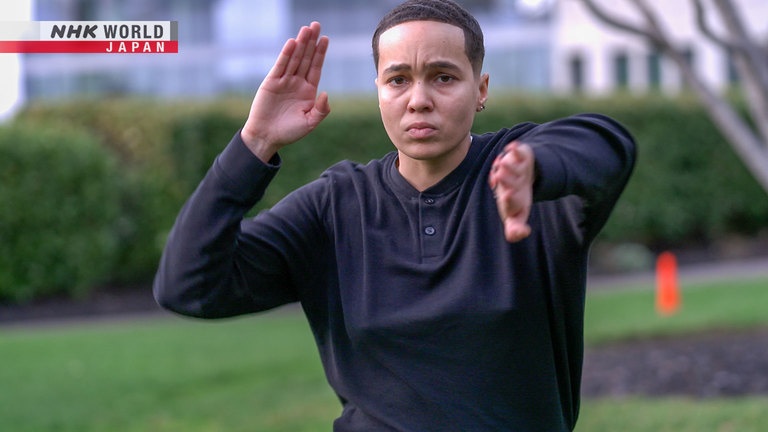Equity Through Budgeting: Shari Davis / Co-Executive Director, Participatory Budgeting Project
Shari Davis encourages young people and minorities to take part in deciding government and school budgets. The process, participatory budgeting, helps strengthen communities and revitalize democracy.



Transcript
Direct Talk
Lately in the United States,
more and more young people and minorities
have been raising their voices
for change in society.
Voter turnout in elections is also
on the increase among young people.
Shari Davis has been committed to
encouraging young people and minorities
to engage more fully in the
workings of democracy, since 2014.
Davis is co-executive director
of the non-profit organization,
the Participatory Budgeting Project.
Participatory Budgeting, or PB,
is a process where
community members directly decide
how to spend a portion of a public budget.
In the past 13 years,
almost 400 million dollars in funding
have gone to initiatives,
from providing laptops
to supporting homeless people
Participatory budgeting is fun.
And it also allows us to
think about government differently,
to actually be a part of it.
We ask Shari Davis
how participatory budgeting
helps to revitalize democracy.
Equity Through Budgeting
Participatory budgeting is important
because budgets are important.
We all make decisions about budgets
large and small,
whether it's in our homes,
we think about
what we care about what we need.
I guess budgets can seem
a little intimidating,
in a spreadsheet and maybe
you don't feel like
you have a lot of experience
weighing in on budgetary decisions.
But everyone has lived experience.
Lived experience that should inform
what kind of budget decisions happen
in a neighborhood.
Participatory Budgeting Project
The process of participatory budgeting
is designed to emphasize the equity of
all the members of a community.
Anybody can present an idea for discussion.
Participatory Budgeting Project
Volunteers develop the ideas
into feasible proposals.
Participatory Budgeting Project
People vote on them
and the winning ideas get funding
for implementation.
Participatory Budgeting Project
Davis has been at the forefront of
getting projects organized in this way.
In one example,
a high school district in Arizona
decided to remove
armed safety officers from schools,
saving $1.2 million.
Students, parents and teachers
are in the process of deciding
how to spend the money,
so that they can feel safe at school.
This is a process that is about equity.
And in the last couple of years,
where there has been an
increased focus and growing focus
around the conversation of racial justice,
the importance of black people
being able to thrive,
the importance of the LGBTQIA community
being able to live safely.
Folks that participate in PB
see a lot of benefits.
Folks report being more likely to
walk into a government owned building,
being more likely to
speak to a public official,
being more likely to consider
running for office themselves,
being more likely to
volunteer in their community.
And so I think it really
opens doors for folks
to take power around
what's happening with them,
but also to see themselves
as a part of government
or a part of changing government.
It creates an opportunity for transparency.
It actually streamlines
the government process.
You're able to have
regular conversation with folks
understand what community
spending priorities are,
and marry those with
government spending priorities
so that we're making
the right decisions together.
If you work in government,
participatory budgeting will allow you
to do your job better,
if you're a member of community,
doing participatory budgeting will allow you
to participate in government better.
Participatory Budgeting Project
Davis believes that
participatory budgeting is a useful tool,
especially for young people,
to practice civic engagement.
Participatory Budgeting Project
And Davis encourages them
to increase participation
by making the process fun.
Participatory Budgeting Project
I've often said that
young people aren't just future leaders.
They're leaders right now.
They have to be.
We have to be willing to listen to
and hold up young people
as they build the skills
that are going to shepherd us
into where we all live together.
I can't think of any major
social transformational movement
that didn't harness
the power of young people.
So we think about mock PB processes,
where maybe we put someone
into a place like Gotham City,
and invite them to think about what it could
mean to redistribute Bruce Wayne's wealth.
And what would it mean to run a
PB process to the tune of $1 billion?
What would be possible?
How would characters and
a Batman story maybe change
if they weren't seen as villains but if they
were seen as valuable members of community?
And we moved from that place to say,
well, this isn't just about Gotham.
This isn't just about like a fairyland.
What does it mean in your city,
in your community
that may happen to be populated
by black and brown people
to really imagine big and design
a participatory budgeting process.
There are so many ways that
we make participatory budgeting fun,
but I'll be honest,
it's not me designing them
It's the young people themselves.
I remember running a youth-focused
participatory budgeting process
in the city of Boston.
And young people said things like
we need a DJ, right?
We need space to convene together,
we need to build relationships
with each other.
We need a walking tour.
I think the most important thing
to tell young people
is that budgets aren't scary.
They're powerful.
And you can be in a position
of great power, to share power,
and to design what your community looks like.
From there. They make it fun.
At this point,
I hear this question a lot.
Well, what do you do when you give
young people control over our budget,
I hear this fear that they're going to
make decisions that aren't great.
They're having conversations
in Oakland, California,
that have to do with community building.
They're not talking about
establishing a taco truck
out front of their school.
But if they were,
I would actually challenge people
to think about why
and why that's an important idea.
I've learned that young people from all ages
have brilliant, smart, practical,
important revolutionary ideas
when they're invited into this process.
I've seen young people
really think about things
that are super practical
like in Phoenix, Arizona,
where it is very, very hot.
In order to get through
the school day safely,
you need regular access to water.
so they've said,
well, actually, we need
more water bottle refill stations,
we need more misters in our school,
we've seen young people say,
hey, in order to get through
the school day safely,
I need to be able to use a functional
and up to code bathroom,
I need a gender-neutral bathroom.
And we see folks do renovation
so that folks are able to
get through the school day,
Davis, whose pronouns are they / she,
says practicing karate has given them
the perseverance to advance their cause.
Teaching karate as a teenager,
is also how they first learned
to work with young people.
Another big influence
came from their parents.
Davis's father fought for civil rights
as a member of the Black Panthers.
Their Mother,
who is black and Native American,
would tell them about
experiencing discrimination.
Their parents' stories taught Davis
about the importance of
working with communities.
My father literally grew up seeing
whites only restroom and colored restroom
and having to navigate segregation
in the South
and my conversations with
my parents as a young person,
included in awareness of the world
and awareness of the dangers of the world,
and awareness of systemic racism.
But also this conversation,
this kind of challenge
this belief that together,
we could protect each other,
protect communities
and change our environment.
My parents often pointed out moments,
be it as part of
Martin Luther King Junior's legacy,
or Malcolm X's legacy
of changing and building community trust.
Hearing these experiences
set Davis on a path to
working for the City of Boston,
where they discovered
participatory budgeting.
There was so much that I learned
in the first time that I did PB,
and it was really powerful.
I had done all of this work at that point,
with Mayor's Youth councils
with deep civic engagement that
centered around young people.
But I had never seen young people
make decisions about public funds.
At the end of it, we saw over 1000 young people
actually engaged in the city-wide vote,
and more than that
participate in every phase of PB.
I was kind of blown away by
what young people were able to achieve
and really inspired about the next cycle.
Davis has launched a new project to
expand the idea of participatory budgeting,
called "New Black City."
It's based on the idea
that minorities in many cities
are marginalized and feel unsafe
in today's society.
The project invites diverse community members
to come up with their dream city.
After collecting hundreds of ideas,
Davis plans to create a comic book
to visualize these dreams.
As a long-time comic book reader,
they hope it will make PB
more accessible to all.
In the last year, I visited 10 countries
across the United States,
and sat with activists,
folks that identify as non-binary,
members of the trans community,
people that are low income, people that are
from all income backgrounds,
to really ask them how they could envision
youth participatory budgeting at scale.
To see black and brown people have
communities where they can thrive,
recognizing that so often,
oppressive and harmful systems
really impact the most
marginalized people in community.
And so this project,
this new black city project
has been about
dreaming about what's possible,
but building a blueprint for the future
We call it collective storytelling.
And I like to think about it
as collective future visioning.
While they're envisioning
this space in the future,
they're also being invited to think about,
well, how did those decisions get made?
How was conflict resolved?
What resources did people really need
to make this not about
a fictitious fantasy land?
So the connections to the budget
are actually important.
But we start by removing boundaries,
and then say, what are your biggest dreams
now let's move backwards
to kind of get there.
And now let's invite people to build
that thing that place with all of us.
During the nine years
Davis has worked in participatory budgeting,
its reputation has grown
as a transformative democratic process.
My life has changed so much
because of participatory budgeting.
And it means a lot to me,
it means an opportunity for me
to practice and learn.
It means an opportunity
for me to be surprised.
It means an opportunity for me
to discover a lot of what I don't know,
There's no world in which
participatory budgeting alone
solves all of the problems.
But instead, when we create
an ecosystem of change,
that focuses on transforming democracy,
with all sorts of other organizations
and movement-based partners,
will now we're really able to
move change forward.
Democracy is important.
I think it is in crisis.
I think most people's experience of democracy
is not around decision making
or shared power.
So to me, there's a promise of
what democracy is
that a lot of people haven't realized yet.
Participatory budgeting creates
a chance for us to live in to that promise
of shared leadership,
of shared power,
of making decisions together.
To me democracy means
being able to understand
what's happening around you,
but most importantly,
to shape what's happening around you.
And there aren't many instances
where we get to do that yet
and I think participatory budgeting is one
where we actually get to
practice real democracy.
How does Shari Davis see
participatory budgeting's role
in achieving true democracy?
To transform democracy,
we have to practice change.
We have to acknowledge that
what has been happening
isn't working to its fullest potential.
We have to build new ways of being,
we have to practice new ways of being
and we have to change the way
that we do business.
it's really important that
we're able to change
and that we're able to
experiment with practicing change,
you don't just change one time
and solve every problem,
you have to practice change.
You have to refine what you're doing,
you have to learn from other impacted people.
It is an iterative process.
To transform democracy,
we have to practice change.